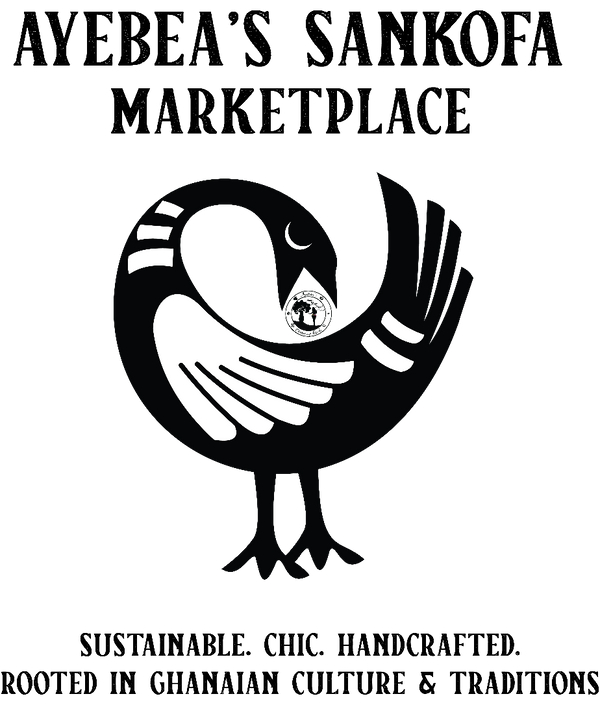"Awura W’agyapa De Nyinaa GuhƆ!" Unraveling the Beauty and Tradition of Ghanaian Waist Beads
"Awura W’agyapa De Nyinaa GuhƆ!" These words, meaning "Young Lady, Your Treasure is Exposed!" in the Akan language, were spoken to me at Kotoka International Airport in December 1997 by a complete stranger. It was my first visit back to Ghana since I had left for the United States. As I bent down to close my suitcase, unbeknownst to me, my beads were slightly peeking out from my jeans. The kind stranger, following tradition, brought it to my attention, and I immediately fixed my pants to cover up my beads.
This incident sparked a deep appreciation for the significance of beads in Ghanaian culture, leading to the creation of Ayebea’s Charming Beads. Through this blog post, I will discuss the rich traditions, the proper way to wear and use Ghanaian waist beads, and why it's important to preserve their cultural significance.
The Intimate Treasures: Ghanaian Waist Beads
In Akan culture, waist beads are considered intimate and personal treasures, often referred to as “ahene." These waist beads are much more than mere accessories; they hold a special place in Ghanaian heritage and are deeply rooted in tradition.
Waist beads are traditionally worn under clothing, next to the skin, and are not meant to be visible to the world. They are intended to be a personal and intimate expression of a woman's beauty, sensuality, and femininity. The sight of beads peeking out in public is akin to revealing one's undergarments to the world, which goes against the cultural norms associated with waist beads.
Bridging Tradition and Modernity
One of the primary motivations behind the creation of Ayebea's Charming Beads is to educate women about the proper usage and significance of Ghanaian waist beads. In this age of social media, there has been a blurring of lines between tradition and modernity, leading to the sexualization of waist beads in mainstream society. Waist beads have been misconstrued as mere fashion accessories to be displayed openly, but their true essence is deeply rooted in tradition and I encourage all wearers to preserve them as such.
The journey to revive the authentic tradition of Ghanaian waist beads begins with understanding their true significance. Journey with me as I work to bridge the gap between the contemporary perception of beads and their true cultural importance.
Exploring the Traditional Essence of Ghanaian Waist Beads
Ghanaian waist beads come in a wide variety of colors and designs, each with its unique meaning and symbolism. Traditionally, these beads are crafted with great care, using high-quality materials and exquisite craftsmanship, as used by our artisan, Abdul. Traditional waist beads are worn for many reasons, including spiritual significance, celebration of rites of passage, and personal adornment. They are a tool to enhance the wearer's natural beauty, promote self-confidence, and symbolize femininity.
Preserving the Cultural Heritage
I strongly believe that as we embrace modernity, it is essential to preserve the cultural heritage associated with Ghanaian waist beads. They are not mere ornaments; they are symbols of tradition, spirituality, and womanhood. Through Ayebea's Charming Beads and the knowledge shared in this blog, I hope to raise awareness about the significance of waist beads and encourage women of all sizes, ages, races, religions, and creeds, to wear them with pride, understanding their historical and cultural importance.
"Awura W’agyapa De Nyinaa GuhƆ!" – "Young Lady, Your Treasure is Exposed!" These words spoken to me at Kotoka International Airport were a reminder of the intimate and culturally rich tradition of Ghanaian waist beads. I invite you to join me on a journey to appreciate and preserve the authentic essence of these beads. By understanding their true significance, we can ensure that Ghanaian waist beads remain a symbol of tradition, beauty, and empowerment, just as they have been for generations.
📷 The Art of Recycled Glass Beads by Nomoda E. Djaba and Philippe Kradolfer



As a traditional leader (King/Chief) from Akuapem Ghana I would say a big congratulations to you Ayebea for this educative and informative blog on Africa especially Ghana. This is a great initiative in sustaining our culture. As a chief who believes in culture, customs and tradition, I will recommend this blog to Africa and the world. This is an inspiring and exemplary move by you. Keep it up beautiful African Ghanaian queen Ayebea
This is so educative! I’m proud to be an African
Thanks Gina for this write up.
Laissez un commentaire